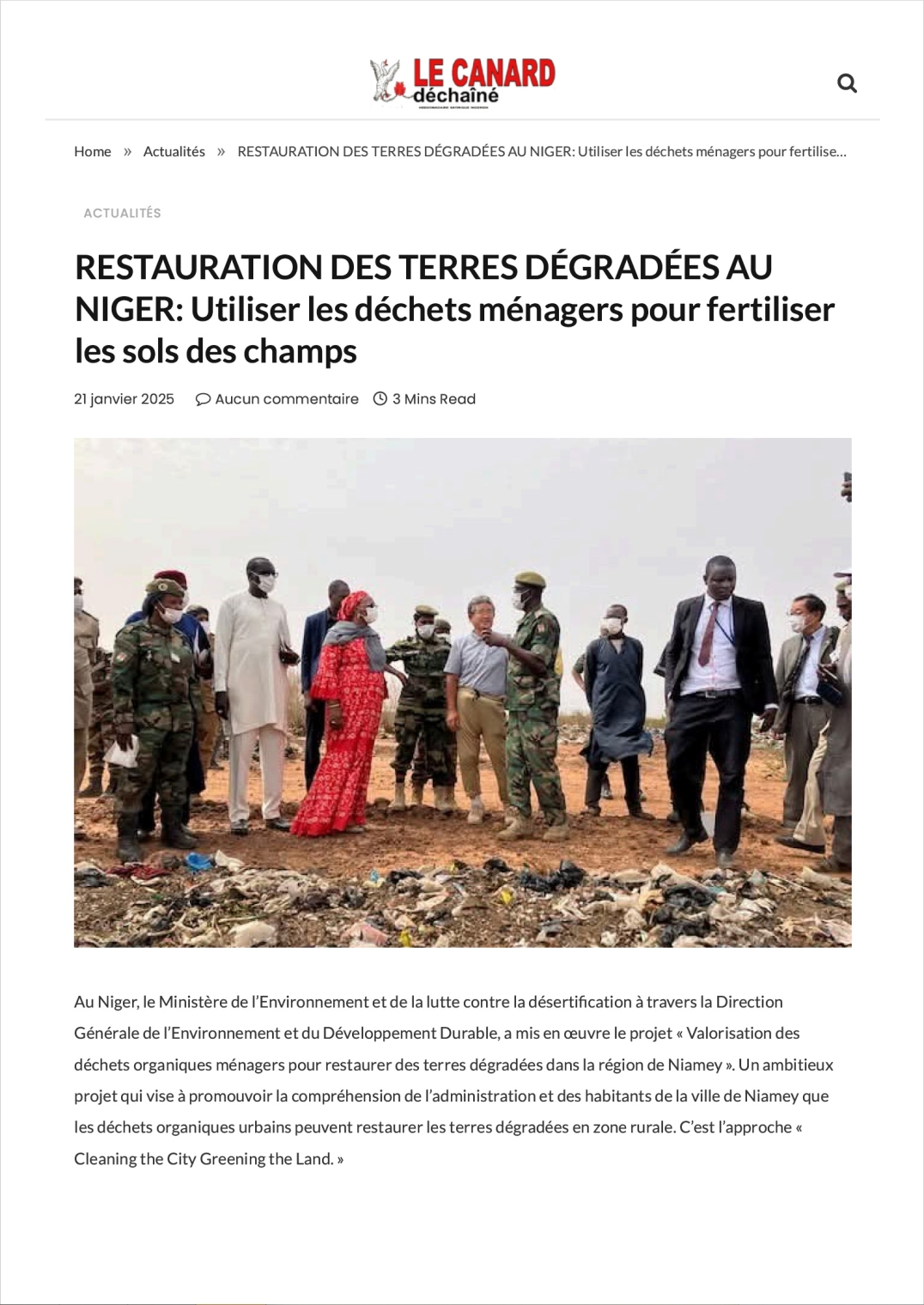2025.1.25
The Project activity was featured in the newspaper “Le Canard” in Niger.
“Le Canard”, newspaper in Niger West Africa, featured the Project activities and result on the Jan.25th 2025 edition. Some of the highlights in the article were:
- In the capital city of Niamey, waste management has become a serious problem.
- Due to financial and policy issues, the transportation of the waste has become a problem.
- Japanese Professor, after observing the local custom designed a management system.
- The system has involve many residents and benefited many more.
- JICA(Japan International Cooperation Agency)and Niger’s Ministry of Environment has been in successful collaboration
- ”Cleaning the City Greening the Land” has been effective to address both waste problem and public hygiene problem.
- Niger’s Ministry of Environment has approved this approach as an official method to fight desertification and greening the Saher.
Source: LE CANARD(French language)
https://lecanarddechaineniger.com/2025/01/21/restauration-des-terres-degradees-au-niger-utiliser-les-dechets-menagers-pour-fertiliser-les-sols-des-champs/
News
Restoration of degraded land in Niger: Using household waste to fertilize field soils.
21st January 2025.
In Niger, the Ministry of the Environment and the Fight against Desertification, through the Department of Environnement and Sustainable Development, has implemented the project << Recycling organic household waste to restore degraded land in the Niamey region>>. An ambitious project to promote understanding among Niamey city authorities and residents that organic urban waste can restore degraded land in rural areas. This approach is called “Cleaning the Cities Greening the Land”.
According to the project’s concept note, Municipal Solid Waste Management (MSWM) has become a priority issue in sub-Saharan Africa, especially in urban areas with ever-increasing populations and human activities. MSWM seems simple enough, but in reality, it’s much more complex, because the politicians, researchers and experts, municipal technicians and private operators in charge of this issue haven’t always found a solution that satisfies the majority of the population. And according to the various players involved, the lack of financial resources is the main reason for this failure.
However, the note makes it clear that <<contrary to the widely-held belief that MSWM in Niger is a financial issue, the many investments made in this sector in recent years have led us to recognize that the issue is much less a financial one than one of organization, or rather management>>.
The analyses and work already carried out show that MSWM is multidimensional: sociocultural (perception), institutional (regulatory framework, players); financial (Polluter-Tax); administrative, political (local government, decentralization) and technical (local standards).
According to experts from the Ministry of the Environment, <<the waste problem cannot be dealt with in isolation, nor can it be limited to the aspects of recovery and disposal alone. It must be viewed from a holistic risk and resource management perspective, covering the entire waste life cycle, from the generation of waste to the final disposal>>. To solve this tricky problem, the Nigerian Ministry of the Environment has decided to adopt the <<Cleaning the City Greening the Land.>> approach. An approach developed by Kyoto University in Japan, in collaboration with the Japanese International Cooperation Agency (JICA) and features a solid household waste treatment method based on observations of indigenous practices in the Haoussa environment. It’s simply an ecological practice that consists of using household waste to fertilize farm soils. Developed and put into practice by Prof. Oyama Shuichi, this method kills two birds with one stone; rids cities of organic waste to fertilize farmlands and also restore degraded land, hence the name of this concept, <<Cleaning the city, Greening the land>>.
A concept which, according to the Department of Environnement and Sustainable Development, has been successfully tested for over 7years in the Dogon Doutchi (Dosso, western Niger) with the Department of Agriculture.
Gare Amadou (Source: Ministry of the Environment and the Fight against Desertification in Niger)
Photo: JICA-Niger
